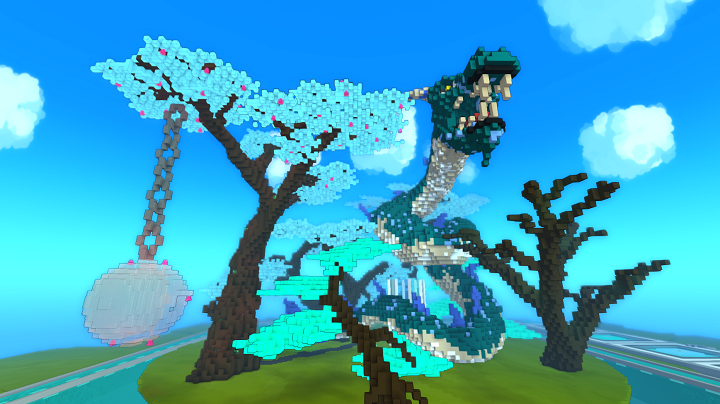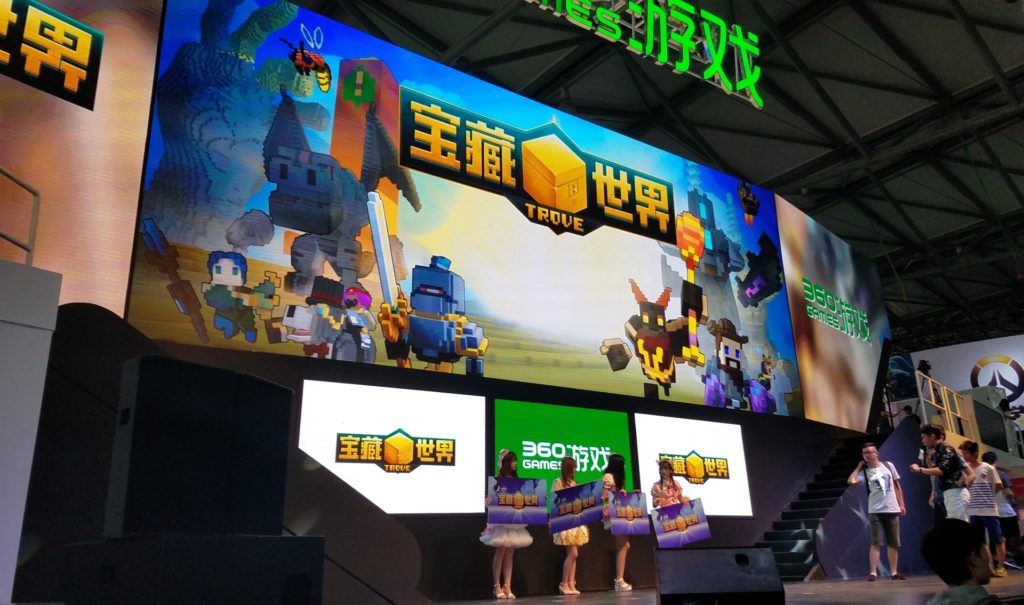When thinking about a fantasy MMORPG (Massively Multiplayer Online Role-Playing Game), few might imagine a game like Trove. In this bright voxel-based world, players are encouraged to band together to face challenges, and (similar to Minecraft) there is a strong emphasis on building and sharing creations with other players. It’s this uniqueness that made it the perfect game to bring to China.
Trion is no stranger to bringing games overseas. In addition to developing games such as Rift and Atlas Reactor, the company currently publishes the Korean game ArcheAge in the US. But in order to do the reverse and publish a Western game in Asia, Trion is partnering with the Chinese company, 360 Games, to support and promote the game in China.
Scott Hartsman, CEO at Trion, talks to [a]listdaily about partnering to bring a relatively new MMO to Asia and how it will stand out in one of the largest PC gaming markets in the world.
What is Trove about, and what makes it the ideal game to bring to China?
Trove is one of the first products that we incubated at Trion in our grassroots pitching project—we put the call out to everybody to submit one-pagers, and we whittled them down from 30 [pitches] to 3 prototypes, and Trove is what came out on top. The idea is: what would happen if we took everything that people love about MMOs and put them into a super approachable package that was very easy to drop-in-and-out of?
The entire game is based around the idea of other players around you being a benefit. Social friction is nonexistent, and getting into playing is a very easy experience. Given how we chose to express that in voxels, it gave us the ability to do that in fully constructible and destructible dynamically generated worlds.
There are a couple of reasons why it’s perfect for China. Number one is drop-in, drop-out gameplay is very convenient, which is increasingly important. If you look back over MMO history—ten years ago, the average play session was four hours, and it was more like a hardcore hobby. The days, people want to play a game that they can get into and out of in twenty minutes, but if they want to stick with it, they can play it for hours. Trove fits that bill very well. It’s also incredibly colorful, which is something that we’ve learned is a critical part of reaching a global audience. A lot of what we do in a typical Western fantasy is very dark and gritty and tends more toward high realism and fidelity, as opposed to colors, where everything is focused on gameplay.
Those two things made 360 Games fall in love with Trove.
Is Trove being adapted to suit the Chinese audience?
In talking with 360 Games, they have some pretty hardcore gamers on their production team, which was great for us. They got the game very quickly and immediately leapt onto some reasonable suggestions to make the game work well for their users. For example, learning the game is part of the fun for a Western gamer, but that isn’t the case for their audience. They want a little more handholding.
Also, if you’re familiar with Minecraft, you should know about biomes. Our game is organized in different biomes. A biome has its own unique creatures, structures, music and visuals. We will be doing some custom biomes along with some custom assets and destinations. But the core gameplay will remain largely unchanged.
Trion has experience bringing ArcheAge from S. Korea to the US. How does bringing a Western game to the Asian market differ?
The way we think about it, it’s the inverse of the relationships that we have today. We already know how to work with partners in shipping builds, schedules, and tweaks back-and-forth and doing press in other territories—all of the things that sit around the idea of getting a game running. [The difference is that] you have to have a lot of trust in your partner about what they’re telling you about their local market. That’s one of the reasons it was so important for us to do a deep-dive on who they [360 Games] are and who the individual people are that are going to be shepherding this game over there. We have to have a lot of faith in them because it’s not like we can surf the forums and read what users are saying. We have to rely on a solid partner that’s knowledgeable, not just in terms of what people are saying about the game, but also that that feedback is being interpreted correctly—and the people working on the game can get at the meat of what we can do to make the game better.
When talking about feedback on any app or game, a lot of the time, what people say isn’t necessarily what they want. But when they have strong opinions, it does speak to some underlying need or way we could do better. We’re very reliant on partners to help communicate that across clearly.
In China, most PC gamers play in arcades and cafes. How do you promote a game in that environment?
That’s the reason there are some territories we do on our own, and there are others that are practically impervious to outsiders. It becomes much smarter for us to partner with experts. When we were evaluating potential partners, a big part of it was: what is this partner’s secret sauce when it comes to reaching out to customers? In the case of 360 Games, they’re a relatively new entrant into the PC games business, but they have a very strong PC software and mobile games business. They have some great thoughts on how to make the PC games business a big part of what they do moving forward. They already have 800 or 900 million installs of PC software, plus a relatively strong slate of PC games coming up. So, they’re able to take advantage of those networks to get the game in front of the right number of people.

How would you describe the Chinese game market?
Having just gotten back from ChinaJoy, it persistently amazes me, not just the scope of what PC gaming is out there, but how news of the size of that market from a customer point-of-view seldom makes it back here organically. It feels like there are almost two different worlds.
ChinaJoy is the second biggest games show in the world, second to Gamescom. It takes place in eleven different tradeshow halls—it’s huge. It’s a huge market and one that’s still strongly growing and extremely vibrant. The scope, scale and spectacle that goes into getting people interested in these games are unlike anything I’ve ever seen.
How did you show Trove at ChinaJoy?
360 Games did a full custom booth build-out with a big stage show and a 50-foot monitor. It was really impressive, and the attendees seemed to like it a lot. The game show that they did had a crowd out in front of it. The booth itself had custom builds that included a huge dragon and our candy-themed biome. People got a kick out of it. It stands out compared to typical fantasy tropes, which Trove is very different from, and contrast is great.
With Trove is releasing for the PlayStation 4 and Xbox One later this year, what do you think is the future of console gaming in China?
Looking at the market in general, consoles in China are going to have a bigger barrier than they do here in the West. If you talk to people on the ground in Shanghai, they’ll tell you that you could have gotten grey market consoles there for years. If they were going to turn into an explosive thing, why haven’t they yet? Then you talk to the other side, which says adoption is held up because they haven’t been 100 percent legitimized.
I think you have to look at what the general culture looks like—and the general gaming culture tends to be more around PC download free-to-play and anything that has inherent piracy protection. Culturally speaking, their PC gaming and core gaming audience grew up fairly differently than ours did. While I think that console gaming could turn into a big thing in China—and we’d be ready in an instant if and when it does—but I think it has bigger challenges than what some of the console makers expect.

